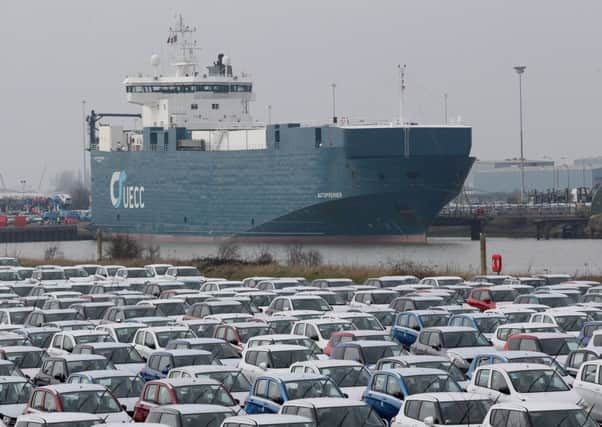Martyn McLaughlin: KFC chicken crisis gives hint of hard Brexit


Why didn’t the chicken cross the road? Well, the answer is fairly complex, involving substandard contingency planning, automation issues, the bedding in of a new IT system, and a dash of bad fortune. No, it’s not much a punchline, granted, but it does in part explain one of the most unexpected consumer stories of the year so far.
The crisis that has engulfed the fast food chain, KFC, forcing it to close hundreds of its outlets around the UK because it ran out of chicken, has prompted many jokes, but as the firm picks over the bones of what went wrong, a story that many have dismissed as a curiosity befitting the ‘and finally’ slot of the evening news is more important than many realise. For while this was nominally about fried chicken, it is, in fact, a metaphor for Brexit.
Advertisement
Hide AdAdvertisement
Hide AdThe chicken, you see, is incidental. The real meat of the matter is in the supply chains, an issue that will become increasingly important as we plunge headlong towards the European Union’s exit door. It may seem like a circuitous journey, but stick with me.
It begins on the northbound carriageway of the M6 near Coventry, where at around 1.45am on Valentine’s Day, a seven-car collision led to a three-mile stretch of the motorway being shut. An hour later, a little further south, two lorries were involved in a collision, forcing the closure of a 10-mile section on the same route.
The disruption impacted on the nocturnal army of haulage drivers who patrol the nation’s main arteries, none more so than those in DHL lorries chock full of KFC’s chicken. Whenever a truck left DHL’s 240,000-square-foot depot in the Warwickshire town of Rugby bound for a cluster of KFC outlets, it became ensnarled in the gridlock. Soon, lorries were unable to get out or in, and a vast backlog of chicken built up in the refrigerated warehouse.
Within 48 hours, KFC franchises found themselves without their one all-important ingredient and had to close their doors. After 72 hours, the crisis extended across the country, with only 266 of the chain’s 870 restaurants able to continue trading. Even now, a fortnight on, the majority are running limited menus, with reports of vast cargos of chicken being dumped by roadsides.
At first glance, it looks like KFC’s travails are the result of little more than rotten timing. The DHL depot in Rugby, a stone’s throw away from the turmoil that unfolded on the M6, would have managed fine were it not for the crashes. It is, after all, situated in what delivery drivers call the ‘golden triangle’, a chunk of middle England close to major road networks which, in theory, allows anything to be delivered anywhere in the UK in a 12-hour window.
The problem, however, ran deeper. Not only did the accidents coincide with the first day of a new logistics contract between KFC and DHL, but the Rugby depot was the only one in the entire UK from which the company’s chicken could be sourced. Only the day before, the previous delivery partner, Bidvest, had been using six warehouses scattered across a wide locale. Had the accidents occurred then, there would have been only minimal disruption to KFC’s business.
The shambles, then, may have been exposed by rotten timing, but it was caused by poor planning, cost cutting and above all, a failure to consider a staggered switchover in the supply chain.
If none of this sounds familiar to David Davis, we should not be in the least bit surprised. The prospect of a hard Brexit is very much a reality, yet there has been next to no indication of how to mitigate harm to the economy when extricating Britain from an integrated pan-European system of trade. Leaving without a trade deal in place would be potentially ruinous, and the food industry would be but one casualty.
Advertisement
Hide AdAdvertisement
Hide AdTake car manufacturers, for example. According to the Society of Motor Manufacturers and Traders, a mere 41 per cent of the components in the average car which rolls off the production line of a British factory are made here.
It is an industry which, like KFC and other fast food outlets, relies on ‘just in time’ delivery, an inventory strategy designed to reduce waste by receiving goods only as and when they are needed in the production process. When it works, it is highly efficient, but the prospect of customs verification checks at borders controls and ports which are designed to facilitate fast-flowing traffic would have a disastrous effect on such a finely honed system.
The empty bluster of the Brexiteers would have you believe issues such as regulatory convergence and a streamlined customs system are trifling matters which will be solved in good time, but without proper transition planning, the harm that will be caused is considerable.
The trade of those British firms reliant on sourcing goods from across the continent will grind to a halt, the scale of our exports will be severely diminished, and the ordinary punter on the street will face higher prices and a scarcity of supply when it comes to everyday goods. The great British chicken run of 2018 is a quirk which has embarrassed one firm for its lack of forward planning, but it should also serve as an exemplar of how things can go seriously wrong when a complicated logistics system is replaced with a woefully simplistic substitute.
In the wake of KFC’s outlets closing, some consumers were sufficiently panicked to call the police or their local MP. God help us for what lies in store after Brexit. Sovereignty – isn’t it finger lickin’ good?
